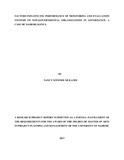| dc.contributor.author | Mulandi, Nancy M | |
| dc.date.accessioned | 2013-11-21T12:11:16Z | |
| dc.date.available | 2013-11-21T12:11:16Z | |
| dc.date.issued | 2013 | |
| dc.identifier.citation | Master Of Arts In Project Planning And Management, University Of Nairobi, 2013. | en |
| dc.identifier.uri | http://erepository.uonbi.ac.ke:8080/xmlui/handle/123456789/59772 | |
| dc.description.abstract | Monitoring and evaluation systems allow for project activities to be measured and analyzed. There is a gap in the design of M&E systems to generate information during the process of monitoring and evaluation and use of this information in future designs. The purpose of the study was to establish the factors influencing performance of monitoring and evaluation systems of non-governmental organizations in the governance sector of Nairobi, Kenya. The study was guided by the following research objectives: to examine how data quality influence performance of monitoring and evaluation systems of non-governmental organizations; to assess how human capacity influence performance of monitoring and evaluation systems of non-governmental organizations; to establish how the use of the logical framework influence performance of monitoring and evaluation systems; and to determine how utilization of monitoring and evaluation information influences performance of monitoring and evaluation systems of non-governmental organizations. The research design used was a survey. The study targeted forty programme officers and five programme managers. All programme officers were interviewed while systematic sampling method was employed to sample programme managers. The data collection instruments included a questionnaire and an interview guide. Data analysis was descriptive in the form of frequencies and percentage. From the study findings, data collection was regular with data analysis carried mainly through software. However, the use of software for data analysis was faced with challenges of storage and processing. Moreover, programme officers had the training and experience working with monitoring and evaluation systems. Lastly, the choice of quantitative indicators compared to qualitative indicators was high while baseline surveys were conducted before project implementation. The study recommends that non-governmental organizations should ensure routine data audit, conduct preliminary assessment of impacts by conducting case studies and to combine the use of the logical framework with outcome mapping. | en |
| dc.language.iso | en | en |
| dc.publisher | University of Nairobi | en |
| dc.title | Factors influencing performance of monitoring and evaluation systems of Non-governmental organizations in governance: A case of Nairobi, Kenya. | en |
| dc.type | Thesis | en |
| local.publisher | School of Continuing and Distance Education | en |

